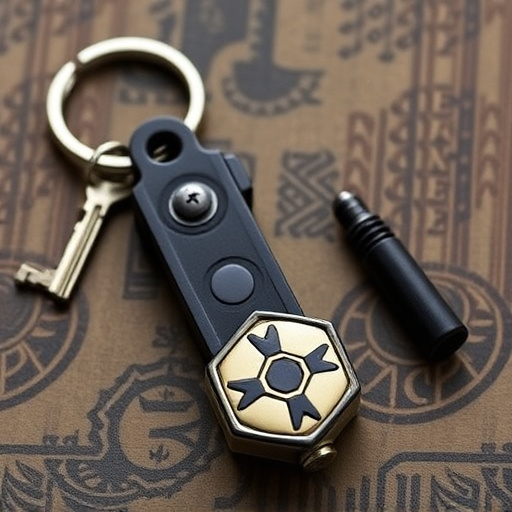Choosing an unbreakable self-defense keychain requires selecting durable materials like stainless steel or titanium for reliability. Understand state laws regarding defensive carry, opt for compact yet sturdy designs, and prioritize durability testing to ensure the keychain's longevity and effectiveness in emergencies.
In today’s uncertain times, being prepared for unexpected situations is paramount. One compact yet powerful tool gaining traction as a personal defense mechanism are unbreakable self-defense keychains. This comprehensive guide explores the essential aspects of these handy devices, focusing on their materials, legality, and practical considerations. From state-specific legal guidelines to tips on choosing the right size and shape, and even durability testing, we equip you with knowledge to make an informed decision for your safety.
- Unbreakable Materials: The Foundation of Self-Defense Keychains
- Legal Carry Guidelines: A State-by-State Overview
- Choosing the Right Size and Shape for Efficient Defense
- Durability Testing: Ensuring Your Keychain's Longevity and Effectiveness
Unbreakable Materials: The Foundation of Self-Defense Keychains
When it comes to self-defense keychains, the first line of defense lies in their construction materials. Unbreakable self-defense keychain materials are essential for ensuring reliability and safety during critical moments. High-quality metals like stainless steel and titanium are renowned for their durability and resistance to damage, making them top choices for such tools.
These unbreakable materials offer not just strength but also a level of robustness that allows the keychain to withstand intense force and impact without compromising functionality. The robust design translates into peace of mind for users, knowing that their self-defense tool is as reliable as it is compact.
Legal Carry Guidelines: A State-by-State Overview
In the United States, the legal guidelines surrounding the carry of defensive keychains vary significantly from state to state. Understanding these regulations is crucial for individuals seeking to protect themselves in case of emergencies. Some states have strict restrictions on the type and size of weapons that can be carried, while others offer more permissive laws. For instance, certain states allow the open carry of firearms with a valid permit, whereas others mandate concealed carry with stringent requirements.
When it comes to defensive keychains, the focus shifts towards unbreakable materials designed for self-defense. Look for keychains crafted from high-strength metals like stainless steel or titanium, which offer superior durability and sharp cutting edges. These materials ensure that your keychain can serve as a reliable tool in dire situations, providing you with an extra layer of security while adhering to state laws governing defensive carry.
Choosing the Right Size and Shape for Efficient Defense
When selecting a self-defense keychain, one of the crucial factors is choosing the right size and shape that lends itself to efficient defense. Opting for a compact yet sturdy design ensures it can be easily carried in your pocket or attached to your keys without adding significant bulk. Look for keychains made from unbreakable materials like high-quality stainless steel or durable aluminum, which offer both strength and lightweight properties.
The shape should allow for a firm grip and easy manipulation, enabling quick access during an emergency. A rounded or slightly angled design can provide better control and comfort, making it easier to use with one hand. Moreover, consider the weight; a well-balanced keychain will reduce strain on your hands and fingers when deploying it for defense.
Durability Testing: Ensuring Your Keychain's Longevity and Effectiveness
When considering an unbreakable self-defense keychain, durability testing is paramount. The ability to withstand rigorous use and remain effective is crucial for any personal safety tool. High-quality materials play a significant role here; opt for those known for their strength and resistance, like stainless steel or tactical-grade aluminum. These materials not only ensure your keychain can handle daily wear and tear but also provide peace of mind knowing it’s ready to defend you when needed.
Testing should include stress on the connection points, where the keychain attaches to your keyring or bag, as well as its ability to withstand impact and pressure. A well-crafted unbreakable keychain will maintain its integrity under extreme conditions, ensuring its self-defense capabilities remain reliable over time.
When it comes to self-defense keychains, investing in unbreakable materials is paramount. With state-specific legal guidelines in mind, choosing the right size, shape, and durable construction ensures not only your safety but also adherence to local regulations. By understanding these key factors, you can select an effective self-defense keychain that serves its purpose while meeting the required standards across different states.
